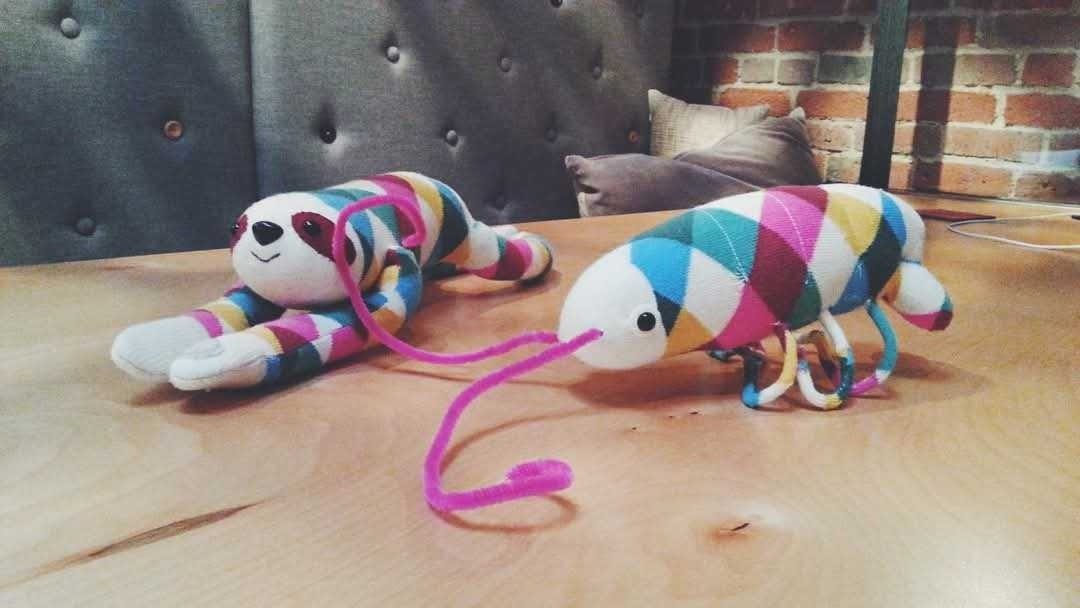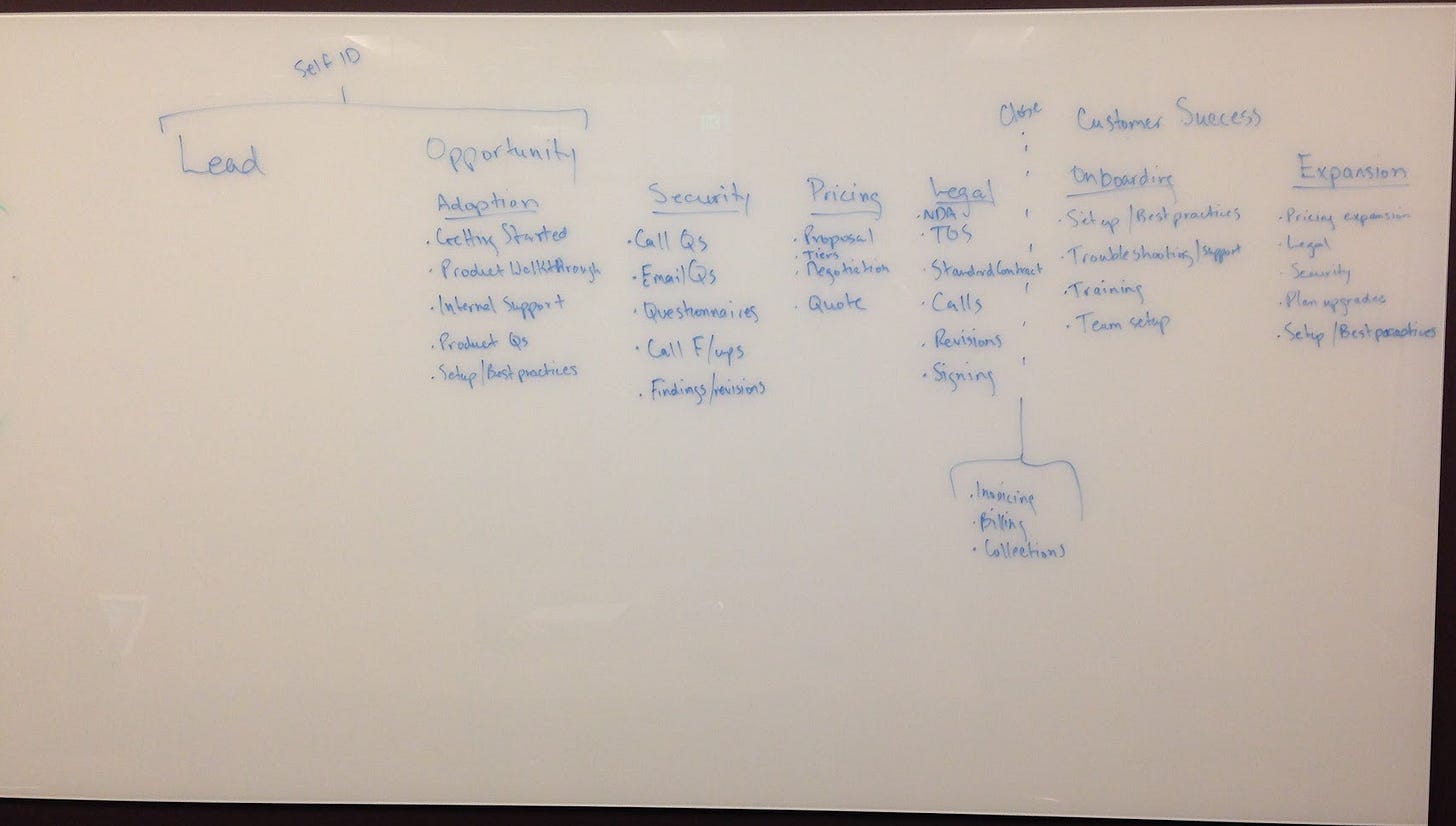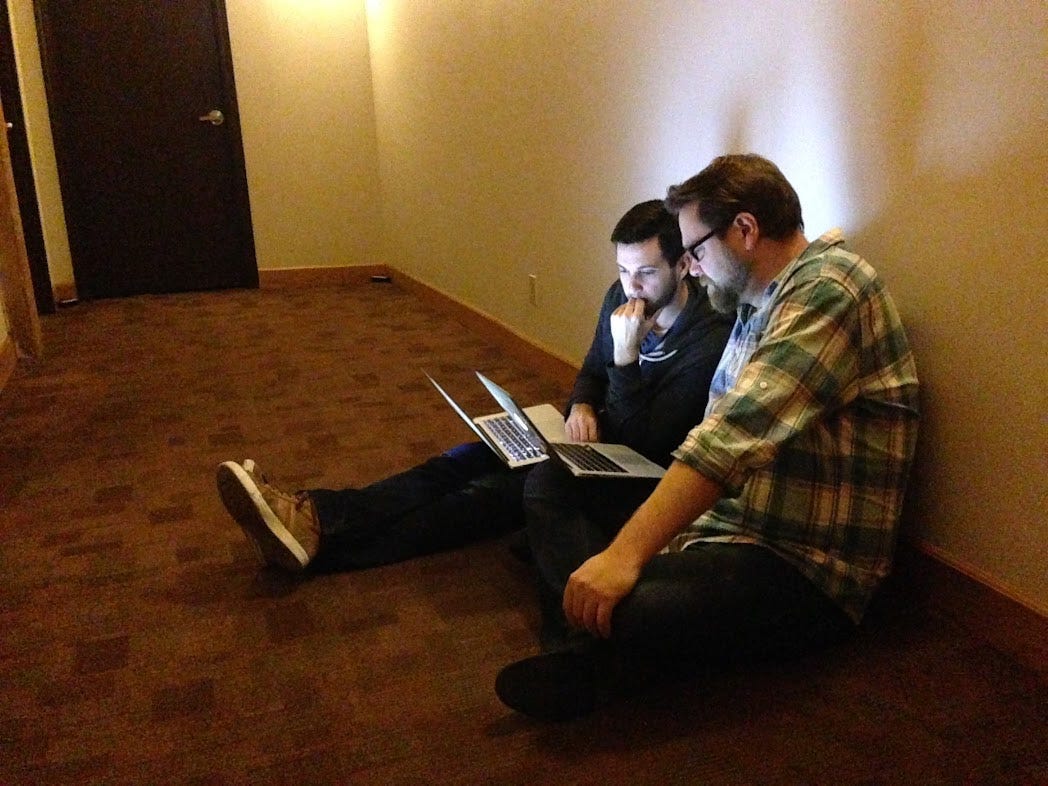Meet the New New Boss: A.J.
Getting another new boss. Mapping how we sold Slack. Finding how strengths can become weaknesses.
My boss Allen sent me a message. He wanted to have a call. My spidey sense tingled. This was odd. Allen never wanted to have a call. He was in SF doing his job and I was in Vancouver doing my job, each of us struggling to keep up and trusting that the other knew their job.
(Context, if you need it: Allen Shim was Slack’s CFO, hired a few months prior. I reported to him because I had to report to someone and my former boss, Stewart, the CEO, was overfull.)

The Vancouver office at the time overflowed with people. We had two rooms crammed full of desks and people doing silent work at their computers. Calls happened quickly and quietly or somewhere else. In the hallways, for example.
I didn’t think my call would be the quickly and quietly kind, so I opted to move it elsewhere. The weather remained fine so I found a park close to the office with a picnic table.
We got the line connected and Allen came to the point: I had a new boss. His name was AJ. Stewart and Allen and AJ had met a few times in SF. A Slack investor had introduced them. They had talked. It had gone well.
To follow up the conversations, AJ had sent Stewart a long email imagining how he could see Slack sales evolving. AJ had been one of the early sales leaders at Facebook. Our Accounts team had to grow. We were hiring in Vancouver. This was us also hiring in SF.
Am I Getting Fired, Again?
That’s pretty much the first thing I wondered: am I getting fired?
I can’t say the news of AJ joining felt confidence inspiring at the time, at the picnic bench in that Vancouver park. It all felt a little precarious. I still hadn’t been an employee for a full year. Less than a year prior I had been hired, fired, then hired again to sit next to the money.
AJ was set to start in a week as Director, Accounts. Wait, really? My title was also Director, Accounts. Yoinks! What could all this all mean and how could it all fit together? I didn’t necessarily assume good intentions or that things would just work out. I was scared of what might be happening.
Kids screamed in the distance as they chased each other around the play structure. Allen wrapped up the call. I sat for some time and made some notes from the call, trying to write what I had heard, trying to get the facts out of my head so I could review them, make sense of them.
When I felt like I had nothing more to write, I called my wife and told her what I had just heard. She helped me touch back on the key things: Did I know I was doing good work? (Yes.) Did the work need to get done? (Yes.) Did the company value the work? (Yes.)
So, then I guess I had to roll with it and trust that it’ll all work out. I took a breath. Then I went back into the dark office from the glorious afternoon sunshine.
The notes below are pretty close to what I wrote on that Vancouver park picnic table, with some updates for clarity. I share them here to show what it feels like to be in the middle of the growth at a succeeding startup. How do you keep your head? It can be challenging to run parallel tracks at once: zoomed in, doing the work right in front of your nose; zoomed out, imagining the future and what changes needed to happen.
The tone of the notes comes across to me now as distrustful and a bit annoyed. And that’s probably close to what I felt at the time. But I really had no reason to distrust Allen or to be peevish or suspicious. The things he had said were all true and direct. In the years I worked with Allen and AJ, they both consistently exhibited very high trustworthiness and integrity. My notes are my reaction.
The last thing I’ll say is that if you rely on plans and predictability and stability, like we all do to different degrees, startups are really hard. I found it consistently testing to not feel much stability. To feel like I was constantly being buffeted and knocked off course by forces I didn’t really understand, that seemed to come out of nowhere.
I got better at seeing those forces coming, or maybe they just happened less frequently, but they never stopped having an impact when they hit me.
AJ Joining — Allen Call Notes
Allen didn't plan for it to work out this way (having two Director, Accounts). It all came together really quickly. He and Stewart had a lot of excitement to find a compelling candidate. It all fit well with the strategy in his head. He apologizes for it coming out of the blue.
He thinks very much that it's consistent with the strategy he wants to put in place for Slack. The recent conversations he had with account manager candidates was very enlightening because hiring someone of their background seems good for now but looking ahead 6 months it gets murkier. Where is strategy driven from?
One of the account manager candidates had some pretty aggressive compensation requests and it felt to Allen like the wrong fit — like he was forcing it to work. Longer term Allen wanted Account Management to be close to Product, Marketing, leadership in SF at HQ.
Allen wants me to be the Vancouver lead and to continue building the team. At some point we don't need to have Sales but we do need to have a sales leader. AJ is young and hungry and been successful in a short amount of time. Allen’s mandate is that 6-12 months from now we'll be larger so how do we put in place the processes, systems, etc.? That's right in AJ’s wheelhouse.
With me I'm very savvy with customers. High EQ on customers, room to grow on doing more of that with a team. That's how he's thinking.
For Allen, he's not going to be the end-all leader in this Accounts / Sales function either. He's been thinking about it a lot and we've been closest to it on the ground. The gaps are becoming much more clearer to him. There's lots to do now (blocking and tackling), Allen will shepherd AJ into his role. I should be focused on helping Vancouver grow, shift strategy so we have more junior folks I can train that are smart, high EQ, that we're just happening to call Account Management.
The immediate goal is to grow the team to 15 - 20 people, then to close to 100 globally in 18 months. He's excited about the future direction of the whole team.
I will report to AJ. AJ will come to Vancouver. If I'm not doing some bit of work today it's probably going to be AJ who does it, but it could also be a joint exercise. I'll be focused on making my team in Vancouver as effective as possible.
Should I feel bashful about coming to Allen about where are we going? I'm doing a great job. He appreciates my work an order of magnitude more than before he started working with the Accounts team.
AJ IRL (In Real Life)
A few days after starting at Slack, AJ flew to Vancouver to meet the team and see the office and create relationships. It was a 2-day trip. The team was 2 people. He arrived in the afternoon on the first day and found the office, a warren of people up a dark staircase without any on-street signage.
By then Kim Graves had joined me doing the Accounts work as one of the first 5. We shared a rectangular desk, facing each other but staggered to share the space. She was on the northwest corner. I was on the southeast.
AJ found some unoccupied space in the northern hemisphere and we made it all work — 3 of us on 1 desk. He wanted to know everything that was happening and learn as quickly as possible. It was elbow-to-elbow job shadowing, lots of conversations between bouts of focused work.
Flipping a used piece of paper, I sketched out for both Kim and AJ all the steps I had seen working with customers. We started calling this our sales process, a name that made it sound more formal than it ever had felt to that point. A few weeks later I recreated that sales process drawing in SF on a whiteboard to include all the parts of a customer acquisition I had worked on.

Working with AJ turned out to be great, once I’d put aside my concerns. He was curious and energetic and wanted to dig into everything. He was playful and generous and serious about results all at once. He had that US east coast ability to triangulate status and meaning from institutions. He’d grown up on the east coast, gone to Harvard and crossed to the west coast for opportunities and reinvention, though a hint of his Boston accent remained.
Those first two days he spent in the Vancouver office felt exhausting in great ways. He brought a new lens to our work at Slack, and he saw new opportunities to improve it. I could see how we needed him on the team and how his skills could help us thrive. But then, sales people can often be the easiest to sell on anything.
On leaving, AJ asked me where I saw my role evolving. Oh, right, hmm. That is a question I should have some thoughts on. Once more, I’m not ready for the change coming at me. I remember I didn’t have much to offer in the moment, but I did tell him I’d give it some thought and write out some notes, and I did.
Follow up Note to AJ
Hey AJ – After our chat yesterday I wanted to follow up on your question about where I wanted to take my role.
I'm clear about the following:
1) I want to work at Slack. I'm happy working with our customers and working with our team. I find the work both challenging and rewarding and want to continue to evolve how we work with customers.
2) I want to play a leadership role. For the near term, I understand that means building the Accounts team in Vancouver. For the longer term, if the leadership of the Accounts team will be in San Francisco, then I'm open to moving to San Francisco.
3) I want to be part of the strategic decision making. I'm highly invested in seeing continued success for Slack. I think my experience with our customers and my expertise throughout the customer lifecycle provides me a viewpoint in Slack that's unique and valuable to drive our strategic direction. I want to apply it to our strategy.
Our Accounts team is certainly set to grow. We're going to be adding people in existing roles and creating new roles for people. As we do that, I want to be part of the conversations. I understand that's difficult sometimes to do with me here in Vancouver, so I'm planning on making more SF trips to stay connected — something Allen and I had been planning.
Hope these more specific and concrete details on what I want to do are helpful to you. It was helpful to me to think through the question and to write them down.
If you have any questions, feedback or want to talk through any of the details further, I'm happy to do that via Slack or Skype. I'd also like to carve out some specific time to talk next week when I’m in SF. Let's check in when I arrive and set that time.
Looking forward to meeting in person and building an amazing Accounts team!
Sooner and Faster Than You Think
That’s the memo I should have gotten earlier at Slack. In fact, I think you could say that I did keep getting it and not heeding as well as I could have: James, things are going to change sooner and faster than you think.
I always found one the hardest things at Slack was to balance out doing the work that needed to be done today, with doing the work that needed to be done to create the company of tomorrow. This tension at Slack felt more heightened because the company of tomorrow was coming at us so fast.
And if I reflect back, I can see that in my first years at Slack I almost always ended up left behind doing today’s work while others marched ahead to prepare for tomorrow’s work. Did I know it at the time? Not in so many words, no. I knew I wasn’t doing all the job I could be doing. I knew I had blind spots and limitations.
But I really didn’t know how to do the ‘imagining the future’ part of the job. I’d never seen it done and didn’t know how to do it. So I defaulted to doing the work I knew how to do.
I also had no clue that in a really fast-changing company, once you have some context on the business and some strong relationships, there is a complex socialization loop where you share elements of your vision of the future and hear others’ visions. You share then reflect, then share again, then reflect and share. Iterate.
This hardly ever happened in a formal way. No one called a meeting for Friday morning at 9 to talk about organizational strategy or team development. It happened before meetings. Over lunch. When you pushed back from your desk and chatted. Slack was full of this kind of informal sharing.
Gradually, as a group, you end up creating a kind of smooshed together picture of what the future could / should resemble. Some numbers and tangible goals get set through the same reflection / sharing process, eventually, when they need to be. Some plans put in place.
Or you understand different visions from your own. And when there are different visions, you maybe have to align with one or another without getting locked in. You have to sometimes sacrifice your darlings, as the guidance to writers goes. Or understand the hills worth standing on, to mix my metaphors.
Eventually did I maybe learn to do some time travel and imagine ahead our path and prepare myself for that new version of Slack? Maaaybe. I learned to socialize the versions I could see of the future, and to listen to others’ visions. But it definitely took some time for me to get it, and held many, many gaps in skills on my part.
I found that the ability to imagine the future ended up as a key skill for progression at Slack. Part of that skill was knowing Slack today, but less than I would have wagered on. And probably less than I would have hoped for and felt invested in. A bigger part of that key skill was knowing the industry standards of the path we were following and the leaders we aspired to emulate.
Before I really realized, we were following the well-trod track of a business-to-business software as a service company. Allen knew this. He could see the path. AJ knew this. He could also see the path. The Slack they had been hired for demanded their expertise on this path. They had both joined to follow the Box, Zendesk, Docusign, Hubspot, Atlassian, Salesforce path and become a category-defining company. That’s the company they had been recruited to, sold on and decided to lead in.
But not me, at first. I only saw the signs later, after they became more evident, of where we were headed.
Up next — Billion With a B: Seeing a fundraising announcement from the inside. Framing it for everyone. Creating the chance to tell our story. Finding the flywheel.



